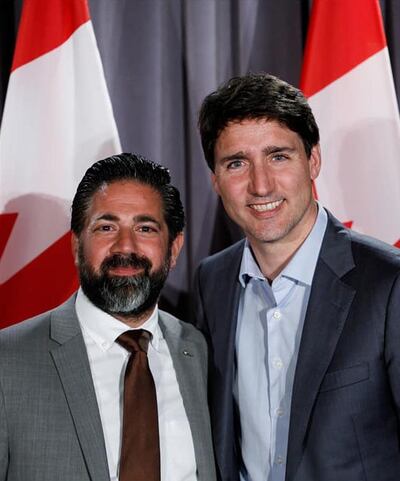The shock appointment of a new Syrian honorary consul in North America with close ties to president Bashar Al Assad, followed by a hasty revocation in his status, has caused deep consternation among the displaced diaspora.
Waseem Ramli had been appointed Montreal’s honorary consul, responsible for processing the paperwork of tens of thousands of Syrians in eastern Canada and much of the US. When photographs emerged of Mr Ramli, beaming as he posed alongside Mr Al Assad, there were fears the Syrian diaspora would be exposed to the long arm of the regime.
When he was separately pictured with Canadian Prime Minister Justin Trudeau, lending the former businessman and restauranteur an air of credibility, it struck fear in the hearts of Syrians across the country, who were terrified they would have to go through him for any official business involving their homeland.

Last night their fears were assuaged somewhat when Canada’s Foreign Affairs Minister Chrystia Freeland revoked his status, saying it should never have been approved. Nevertheless, the episode has highlighted the vulnerability of the diaspora, particularly refugees who fled the regime.
Mr Ramli had been due to take up his post next week, a position that would have given him the authority to handle the affairs of thousands of Syrians in Canada, including refugees who had been resettled in the country by the Trudeau government, as well as about 250 members of the White Helmets, the volunteer rescue group that saved countless lives from the rubble of areas decimated by Assad regime airstrikes.
According to Maclean's news magazine in Canada, Mr Ramli branded the White Helmets a "terrorist organisation" and an "affiliate of Al Qaeda" in an interview while his social media pages carried propaganda in support of the regime and the red Hummer he was seen driving around Montreal had the president's visage sprayed on a window.
Yet Maclean's also reported how, after he appeared at a Liberal Party fundraiser in the summer alongside Mr Trudeau, he was nominated for the position by the government in Damascus.
It also alleged Mr Ramli had tried to intimidate Syrian opposition activists in Canada taking part in protest activities by taking photos. Mr Ramli denied the allegations but acknowledged in the interview that he had raised money for the Syria Trust for Development, the charity run by Mr Al Assad’s wife Asma.
When the allegations emerged, Ms Freeland expressed shock at Mr Ramli’s “unacceptable” appointment and said: “No one who shares Mr Ramli’s views should have ever been approved by Global Affairs Canada to serve in this capacity. Upon review of the department’s decision, I have instructed officials to immediately revoke his status.”
As commendable as the swift response has been, addressing the genuine concerns of vulnerable Syrians in Canada, many of whom arrived in the country as part of a resettlement programme that has taken in thousands of displaced Syrians, it is nevertheless concerning how Mr Ramli came to be appointed in the first place.
Many of those Syrians were welcomed at a time when anti-refugee sentiment, xenophobia, nationalism and physical and metaphorical walls were going up all over the world.
The challenge of balancing the needs of ordinary Syrians to conduct government business while avoiding the veneer of normalisation with a regime responsible for the slaughter of hundreds of thousands of Syrians has always been a tough one.
The Syrian state is an unavoidable interlocutor for a variety of routine transactions, such as renewing a passport, designating power of attorney or getting married. It has taken advantage of that position to raise millions of dollars at a time of economic hardship and war. The Syrian passport is one of the most expensive in the world and in a country like Turkey, which has more than three million refugees and is teeming with members of the opposition, it can cost more than $1,000 to get an expedited passport that might only be valid for two years.
Syrian consuls were rarely more than bureaucrats who generally avoided the limelight, antagonising host countries, or being overtly visible, even if they were loyal functionaries. This allowed consular activities to continue uninterrupted, even in countries that were hostile to the Syrian government. In exchange, the regime was able to raise funds.
Accepting the appointment of a provocative apparatchik in the Canadian case was particularly puzzling as Damascus does not hold any leverage over Ottawa.
The Assad regime has all but won the military conflict, yet has limited resources to draw upon to alleviate its economic crisis. It craves international legitimacy and the eventual lifting of sanctions and reconstruction aid to rehabilitate its image and its powers.
The Assad regime’s victory, enabled by the support of Russia and Iran, has spurred a halting and largely behind-the-scenes effort among some western powers to re-establish contacts with the Syrian government. This is driven by a variety of factors, among them the realpolitik of dealing with a central government that is there to stay for the time being, fear of a prolonged war, the possibility of an economic crisis spurring new waves of refugees and migrants, the chance to mediate in a political solution between the regime and the opposition, and a desire for a slice of the lucrative reconstruction pie.
But the Canadian example offers a cautionary tale. It is far from a wholesale embrace of a bloodsoaked regime but it highlights the vulnerability of the human beings who have had to flee this regime’s many war crimes and atrocities. Making them part of the conversation in how to re-engage with Syria and push for justice, accountability and a guarantee of their basic rights is paramount.


